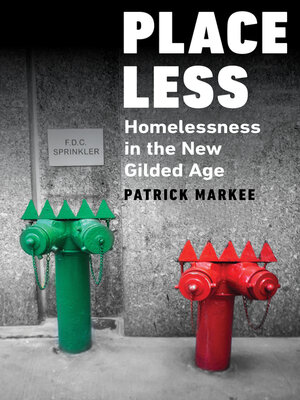
Sign up to save your library
With an OverDrive account, you can save your favorite libraries for at-a-glance information about availability. Find out more about OverDrive accounts.
Find this title in Libby, the library reading app by OverDrive.



Search for a digital library with this title
Title found at these libraries:
| Library Name | Distance |
|---|---|
| Loading... |
In the tradition of Matthew Desmond's Evicted, a longtime housing activist presents a vivid and myth-breaking account of why homelessness endures in contemporary America...
Millions of people are affected by homelessness, but media pundits and politicians see homelessness as a social work problem, or a matter of personal pathology, or some peculiar subspecies of urban poverty.
Informed by the author’s own front-line experiences from more than two decades working as an advocate for homeless people in New York City and his work with housing activists across the country. Placeless: Homelessness in the New Gilded Age presents an alternative and innovative, wide-angle view of homelessness and displacement in New York and elsewhere.
A tour of the geography of homelessness in New York City, where some 100,000 people a night sleep in the city’s shelter system, Markee visits certain city landmarks where homeless New Yorkers struggle to survive:
armories once built to quarter militias who put down worker uprisings a train tunnel underneath Riverside Park a grim intake center where infants, children, and families were forced to sleep on office floors a former psychiatric wing of Bellevue Hospital now sheltering hundreds of homeless men each night a Manhattan park surrounded by luxury condos where the police routinely harassed homeless street-dwellers
Blending historical analysis, urban theory, and the latest policy research, Markee considers homelessness in America as a tragic yet inevitable consequence of economic shifts inaugurated in the Reagan era, worsening inequality and housing affordability, systemic racism, and neoliberal government policies.
At a moment where tabloids and politicians use homelessness as an excuse to whip up fear, Placeless is a powerful and moving account of a social problem whose solution is entirely possible.
Millions of people are affected by homelessness, but media pundits and politicians see homelessness as a social work problem, or a matter of personal pathology, or some peculiar subspecies of urban poverty.
Informed by the author’s own front-line experiences from more than two decades working as an advocate for homeless people in New York City and his work with housing activists across the country. Placeless: Homelessness in the New Gilded Age presents an alternative and innovative, wide-angle view of homelessness and displacement in New York and elsewhere.
A tour of the geography of homelessness in New York City, where some 100,000 people a night sleep in the city’s shelter system, Markee visits certain city landmarks where homeless New Yorkers struggle to survive:
Blending historical analysis, urban theory, and the latest policy research, Markee considers homelessness in America as a tragic yet inevitable consequence of economic shifts inaugurated in the Reagan era, worsening inequality and housing affordability, systemic racism, and neoliberal government policies.
At a moment where tabloids and politicians use homelessness as an excuse to whip up fear, Placeless is a powerful and moving account of a social problem whose solution is entirely possible.







